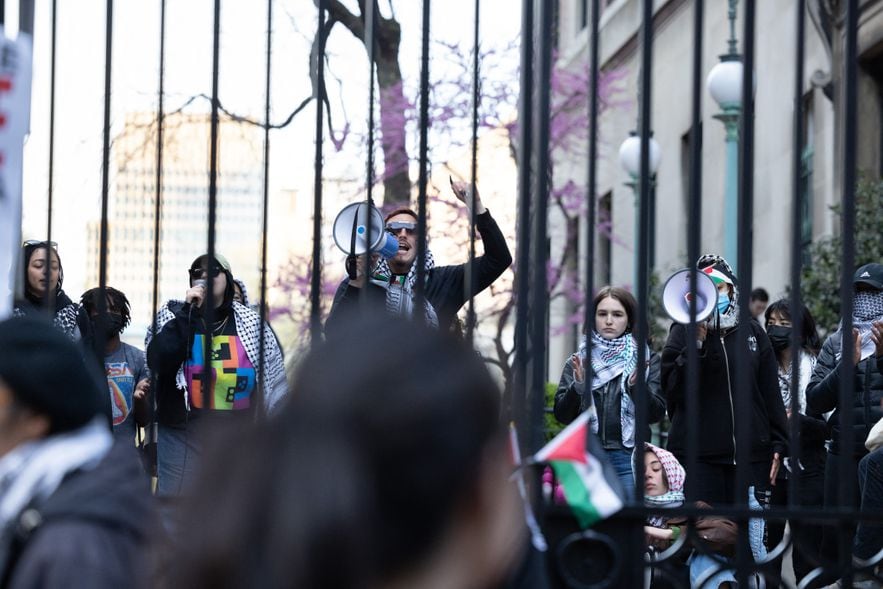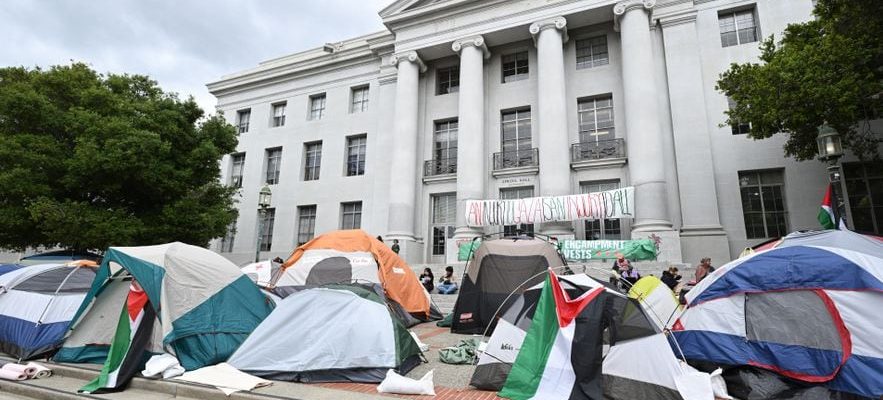After observing demonstrations and arrests of hundreds of pro-Palestinian students across American campuses throughout the week, around thirty students from the University of Minnesota decided to occupy their place of study, according to THE Washington Post. A third of them were arrested this Tuesday, April 23, accused of illegal trespass.
For several days, American students have been demonstrating at various universities to demand that their establishments break their partnerships with companies linked to Israel, or which profit from the war in Gaza. Anger erupted from Colombia University where hundreds of students occupied the campus lawns on Wednesday April 17.
The arrest, Thursday, April 18, of around a hundred of them after the president asked the police to intervene, created a shock wave in different campuses: “of Yale University and MIT on the East Coast to Ohio State University in the middle of the country, via Stanford University and the University of California at Berkeley in the West,” lists the Washington Post. THE Time, for his part, speaks of a dozen universities mobilized. To justify its use of law enforcement, the university claimed to have observed “hostile and disruptive public order” behavior. “We also learned that there were intimidating slogans and that several anti-Semitic incidents had been reported,” according to a spokesperson.
Students set up a camp at the University of Berkeley (California, United States) to demand an end to the war in Gaza and an end to American funding to Israel, April 23, 2024.
© / Anadolu via AFP
“My university administration, my elected representatives in Congress and even the president behave as if they were spokespersons for the Jewish community, equating anti-Zionism with anti-Semitism. They silence us, suspend us” , denounced in front of the press, keffiyeh on her shoulders, Sarah Borus, a pro-Palestinian Jewish student from Barnard College at Columbia University.
During the night from Monday to Tuesday, similar scenes took place at New York University (NYU), where 120 people were arrested, according to a downwardly revised police report. “It was extremely violent,” one student told Time. These people were released, a spokesperson for the NYPD, the New York police, told AFP. But the tension is far from easing.
At Yale, around fifty people were arrested in similar circumstances. On Tuesday afternoon, outside the Columbia campus, about 100 protesters marched peacefully in a circle, holding signs calling to “stop all U.S. aid to Israel.”
Conflagration on campuses
Many American universities have found themselves at the heart of the news with the war in Gaza, triggered almost seven months ago by a Hamas attack in Israel. Accused of not doing enough against anti-Semitism, two university presidents, including Harvard, had to resign a few months ago. In recent days, several campuses have been set ablaze, including receiving signs of solidarity from the teaching staff.
At NYU, a faculty association strongly denounced the university’s “unjustified” decision to call the police for help, further asserting that “no one on the square was, at any time, violent or anti-Semitic.” . Marianne Hirsch, a professor at Columbia and herself of Jewish faith, told the press that she was “extremely concerned about anti-Semitism, and always has been.” But “I am extremely shaken at the moment by seeing how anti-Semitism is exploited and misused […]to put an end to academic freedom, free debate, critical thinking,” she said.
“They called us settlers”
The topic has turned into a heated and often violent debate over free speech. Students and teachers accuse their universities of seeking to censor political speech, while several personalities, including elected representatives of Congress, in return accuse activists of fueling anti-Semitism – which the students refute. The Republican President of the House of Representatives, Mike Johnson, also announced that he would meet with Jewish students at Columbia on Wednesday to discuss “the worrying rise of virulent anti-Semitism” on campuses.

Pro-Palestinian demonstrators gather to protest inside and outside the locked gates of the Columbia University campus in New York, the United States, April 23, 2024.
© / NurPhoto via AFP
On CNN, a Jewish student from Columbia, Nick Baum, said he had felt “downright in danger” for several days. “They called us settlers,” he said. “I think it’s very important to remember that being uncomfortable is different from being in danger,” another Jewish student, Soph Askanase, who said she was suspended by Columbia for her activism a few hours before being arrested.
Faced with tensions, the university said it was working “hard to resolve the situation on campus”. Students “have the right to protest, but they are not allowed to disrupt campus life or harass and intimidate other students and members of our community. We act on concerns expressed by our Jewish students,” said Ben Chang, a Columbia official. Access to the university was thus prohibited to certain students who participated in the demonstrations, who were suspended, according to CNN. On Sunday, Democratic President Joe Biden himself intervened, saying that anti-Semitism had “no place” on campuses.
